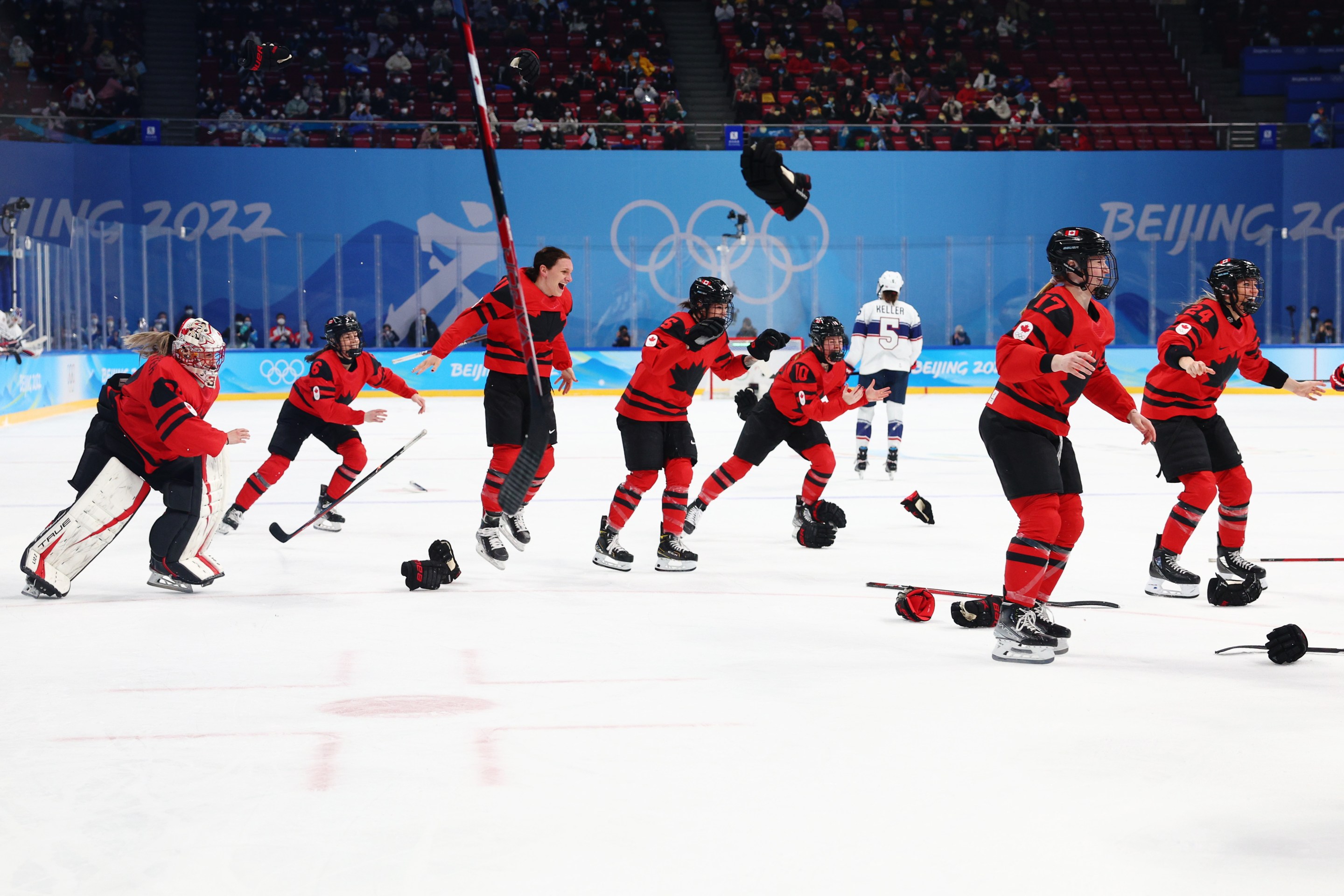Sometimes hockey feels cruel for its randomness, but sometimes in the randomness there's justice. Maybe Hannah Brandt missing a wide open net a couple minutes into the first period and Alex Carpenter sending a shot off the crossbar early in the third weren't haunting missed opportunities for the Americans but instead signs that the best, most offensively gifted Team Canada in history was simply supposed to win the Olympic gold medal they won Thursday, 3-2 in regulation. The Canadians outplayed the Americans for nearly the entire game and looked poised to reclaim gold from the very beginning of this tournament; it's only right that the breaks went their way.
Sarah Nurse scored first for Canada, deflecting in a shot from a face-off less than a minute after a goal from her teammate Natalie Spooner was disallowed because Nurse was offside. "It was funny," Spooner said. "Nursey came up to me on the bench and said, 'I owe you one, I was offside', and then she goes out and scores." That was Canada's style all tournament: relentless, never frustrated, able to go out and score at will. Improbably, that was Nurse's style all tournament, too. She spent the world championships and the first few games of these Olympics on Canada's fourth line, but soon found herself on a top line with Brianne Jenner and Marie-Philip Poulin. By the end of the gold medal game, Nurse had broken Hayley Wickenheiser's record for points in a single Olympic tournament, with 18. As for Poulin—crusher of American spirits, the greatest to ever do it—she scored Canada's next two. On the first, she intercepted an American clearing attempt, catching goalie Alex Cavallini by surprise. Then she banked in a rebound from a sharp angle on the rush. This brings Poulin to an incredible seven goals in four Olympic gold medal games. "We almost had to laugh about it," Spooner said. "I mean, we call her 'Captain Clutch' for a reason."
What a play by Marie-Philip Poulin.
— NBC Olympics (@NBCOlympics) February 17, 2022
Poulin strips the puck away and Canada leads 2-0 over Team USA in the gold medal game.#WinterOlympics
📺 : @nbc and @peacockTV
💻 : https://t.co/muRHLBCyRd pic.twitter.com/WU663dnPRq
To win, Canada beat Team USA at its own game. They held the edge in face-offs (Poulin won 17 of 23 draws) and maintained possession much more thoroughly than they had in their last game against the U.S. That signature Canadian forecheck worked so well that "a quality scoring chance" or "simply one single controlled zone entry" became something like a fantasy for the U.S., and forget “actually getting anything past Ann-Renée Desbiens." Gone were the Americans of the group stage game, who could at least sustain some pressure in Canada's end. Whatever the U.S. tried in the offensive zone just felt like a waste of everyone's time.
Though conventional wisdom said that Team USA would need to assert their advantage at even strength, the U.S.'s first goal came, funny enough, on a penalty kill that had been among the worst at the Olympics. Hannah Brandt made a play on the boards to spring Hilary Knight. Her shorthanded goal late in the second period kept the U.S.'s hopes alive for a bit.
THE UNITED STATES IS ON THE BOARD! 🇺🇸
— NBC Olympics (@NBCOlympics) February 17, 2022
Hilary Knight with a short-handed goal! @usahockey #WinterOlympics | #WatchWithUS
📺 : @nbc and @peacockTV
💻 : https://t.co/muRHLBCyRd pic.twitter.com/J1Qr2V5rjd
If the U.S. was surprisingly weak at even strength, their relative weakness elsewhere was more expected. The power play's been in rough shape all year, and only converted in this game when it was too late. Amanda Kessel scored with just 12.5 seconds left and an empty American net.
The 3-2 score belies an uglier game. A U.S. roster this talented can only lose so badly; the problem is that a roster deployed this way can only play so well. The American coaches showed no confidence in their depth, certainly not the confidence the Canadian coaching staff showed in theirs. (No Brianna Decker hurt the Americans, but losing one player shouldn't be so devastating.) Where Canada's top forwards played about as much as their third line, the American top six all finished with around 23 minutes of time on ice. I remember thinking early in the tournament that the line of Abbey Murphy, Jesse Compher and Hayley Scamurra could be the most fun and dangerous fourth line at the Olympics, which was very wrong of me, because to be dangerous you have to play. The situation was the same on the blue line. For the third straight game, the U.S. dressed seven defensemen but only five got meaningful ice time. "Meaningful" in two cases meant insane: Megan Keller and Cayla Barnes played half the game.
Big games call for big players to play big minutes, fine, but wearing down your top talent all tournament makes it tough for them to beat a team whose chief weapon is its punishing speed. Nor can exhausted players really win puck battles and withstand forechecking pressure the way the American system asks them to. "Line combinations and ice time are always one of those things that when you win, nobody asks that question. When you don’t win, all of a sudden everybody’s got curious questions," said head coach Joel Johnson after the game. A very interesting point. I wonder why that is.






